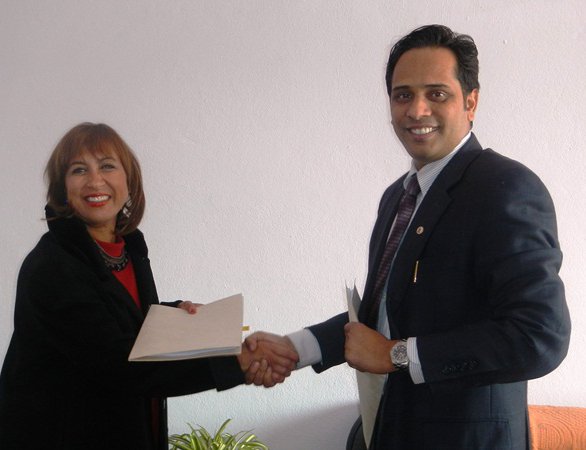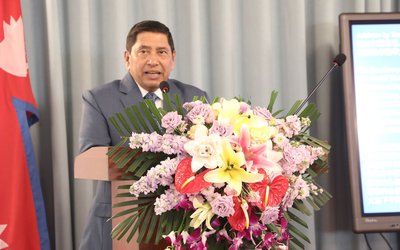
The Country Program Action Plan (CPAP) between the Government of Nepal and UNICEF for the period 2013-1017 was signed at a short ceremony in Kathmandu recently. Madhu Kumar Marasini, Joint Secretary, Ministry of Finance, and Ms. Hanaa Singer, UNICEF Representative, signed on the document that outlines programs that will be implemented according to the Basic Cooperation Agreement between the Government and UNICEF of 1996. This is the 4th CPAP between the Government and UNICEF since 1996.
The overall goal of UNICEF’s country program (2013-2017) is to directly address the policy, system, and societal factors that influence equitable access to education, health care, nutrition, sanitation, clean water, protection and information for women, adolescents and children. It will do so by focusing on 15 low performing districts (10 in the mid and far western hills, 4 in the central terai and 1 in eastern terai), helping the government to narrow the gap between the have and have nots, and by developing and refining legislation and multi-sector policies at national level. It will help to build more responsive, quality services in the field of health, education, protection etc. especially to those who are most deprived, and will focus on changing social norms and behaviors of individuals, communities and society to improve their lives and those of their children and adolescents.
The main areas of focus for the US$ 144 million CPAP are: Governance, Policy, Planning and Evaluation; Health, Nutrition and HIV; Education; Child Protection; Water, Sanitation and Hygiene; and a new program on Adolescent Development and Participation.
Alongside other partners, UNICEF has contributed to many of the development gains achieved by Nepal, especially in maternal and child health, basic education, HIV prevention and treatment, child protection, nutrition, water and sanitation, and evidenced-based policy. UNICEF Nepal currently has 175 staff and has zonal offices in Biratnagar, Bharatpur and Nepalgunj.
The Country Program Action Plan (CPAP) between the Government of Nepal and UNICEF for the period 2013-1017 was signed at a short ceremony in Kathmandu recently. Madhu Kumar Marasini, Joint Secretary, Ministry of Finance, and Ms. Hanaa Singer, UNICEF Representative, signed on the document that outlines programs that will be implemented according to the Basic Cooperation Agreement between the Government and UNICEF of 1996. This is the 4th CPAP between the Government and UNICEF since 1996.
The overall goal of UNICEF’s country program (2013-2017) is to directly address the policy, system, and societal factors that influence equitable access to education, health care, nutrition, sanitation, clean water, protection and information for women, adolescents and children. It will do so by focusing on 15 low performing districts (10 in the mid and far western hills, 4 in the central terai and 1 in eastern terai), helping the government to narrow the gap between the have and have nots, and by developing and refining legislation and multi-sector policies at national level. It will help to build more responsive, quality services in the field of health, education, protection etc. especially to those who are most deprived, and will focus on changing social norms and behaviors of individuals, communities and society to improve their lives and those of their children and adolescents.
The main areas of focus for the US$ 144 million CPAP are: Governance, Policy, Planning and Evaluation; Health, Nutrition and HIV; Education; Child Protection; Water, Sanitation and Hygiene; and a new program on Adolescent Development and Participation.
Alongside other partners, UNICEF has contributed to many of the development gains achieved by Nepal, especially in maternal and child health, basic education, HIV prevention and treatment, child protection, nutrition, water and sanitation, and evidenced-based policy. UNICEF Nepal currently has 175 staff and has zonal offices in Biratnagar, Bharatpur and Nepalgunj.
- FOREIGN EXCHANGE: Largest Deposit
- Jul 22, 2024
- IMF: Approval Of SDR
- Jul 22, 2024
- NEPAL-KOREA RELATIONS: Fifty-Years Of Warm Relations
- May 31, 2024
- NEPAL-BRITAIN: Centenary Celebration
- May 31, 2024
- POLITCS: Forming New Alliances
- May 27, 2024
















